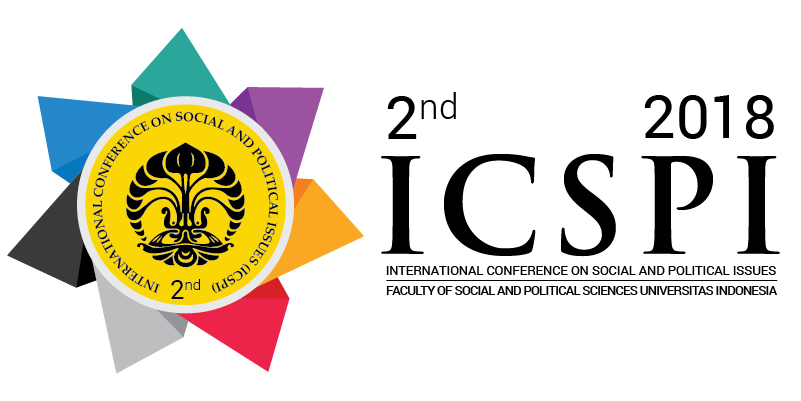The 2nd International Conference on Social and Political Issues (ICSPI) 2018
Prime Plaza Hotel & Suites, Sanur - Bali
October 29, 2018 – October 30, 2018

In recent decades, fundamental challenges to nation-building have emerged in many parts of the world. The Westphalian state-system, whichwas consolidated during the 18th and 19th century and gave birth to hundreds of modern nation states in the 20th century, has been challenged externally as well as internally. In the 21st century, external pressures to nation-building come from globalization and transnational movements that reorientate societies in directions away from the Westpalian system. Concomitantly, nation-state's have to face social breakdowns, cultural dichotomies, financial crises and political tensions. These problems have taken place while the world keeps moving on; we have produced advanced technologies, created more wars, further depleted the environment, and driven the mobilization of people. These complex circumstances have demanded smart state responses and sophisticated governance. When the state fails to respond and govern, nation-building is challenged by identity politics, populism and transnational movements.
Building and protecting the nation and nationhood have become complicated amid rising local, national and regional currents, as well as global issues. These make it challenging for the state to be able to stand as a political entity. This is not only experienced by countries that are socio-culturally and historically diverse, such as Indonesia, but also by countries whose societies are considered to be homogeneous. On one hand, the spread of identity politics has placed diversity -which has been recognized and celebrated- under serious threat. On the other hand, identity politics also condition people, who were originally labeled 'homogeneous', into different and antagonistic identities. Identity politics is not only used as a tool of interest by primordial-based groups – it is also ideologically and/or interest-based in order to achieve certain political goals. This problem has been paramount in Indonesia and many countries in the world in the last decade.
It is generally known that nationalism constitutes a single concept that has many meanings. As a concept, nationalism is basically the result of social construction, which is open to reconstruction and even deconstruction. Nationalism may evolve into two forms - moderate and radical. The former is based on the principle that the interests of the state are the most important and that loyalty lies beyond primordial-based groups. The latter aspires to subordinate other nations (through chauvinism, which may grow to become ethno-nationalism). The on-going process of construction, reconstruction or deconstruction of nationalism can lead to ethno-nationalism, whereby identity politics and populism take place.
Identity politics have been facilitated by the wide-spread utilization of social media, which has the ability to shape public opinion and mobilize mass campaigns. Thus, the advancement of communication technology poses dual functions in political processes - to enhance political developments by enhancing transparency and public participation, and to create democratic drawbacks by spreading hoaxes and fake news for political purposes. While these phenomena might take place in countries undergoing democratic transitions, mature democracies also experience similar political processes as they face financial hardships and influxes of migrants. For social scientists, these problems open up space for debate and further research.
The complexity of socio-cultural, political and economic circumstances have strengthened the role of science in overcoming local, national, regional and global problems. Scientific research is required to identify a wide variety of solutions to societal problems, which no longer relate solely to a particular discipline, but are multi- and trans-disciplinary. In addition, recent research has changed the traditional role of academia, demanding more collaboration in the production of science, not only among universities, but also among researchers, social activists/practioners and policymakers.
Considering these issues, the second International Conference on Social and Political Issues (ICSPI) will be held by the Faculty of Social and Political Sciences, Universitas Indonesia (FISIP UI) in 2018 under the theme Rethinking Nationalism: Looking Back and Looking Forward. Scientific inputs from all parts of the world are welcome, academically and practically. Various perspectives, based on mono-disciplinary, multi-disciplinary or trans-disciplinary research are expected to examine the problems and contribute to solutions.
The theme is closely related to the Nationality Forum, established by Universitas Indonesia, to contribute to the nation. Thus, the goal of this conference is not only to build and produce knowledge, but also to develop recommendations based on the thoughts and experiences of scholars, practitioners and other strategic stakeholders, who are expected to participate in this conference. In other words, the conference not only aims to enrich existing theory-based knowledge, but also to develop scientific-based policies that contribute to nation-building.

Conference Information
- » Overview
- » Track Policies
- » Accommodation
- » Timeline

This work is licensed under a Creative Commons Attribution 3.0 License.
Important! For Authors of ICSPI
Guide For Editing Abstract(s) : CLICK HERE
Guide For Submission: CLICK HERE